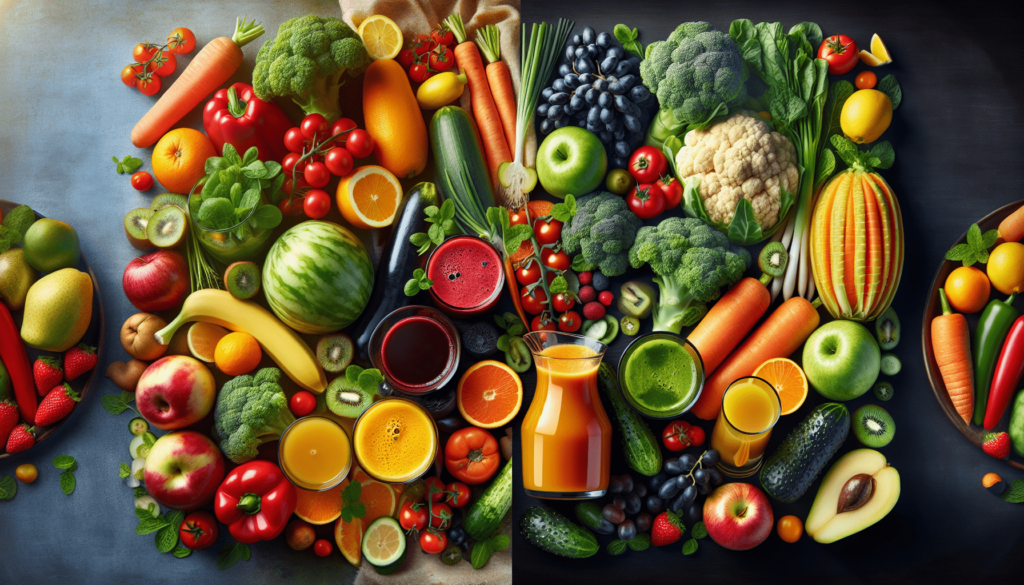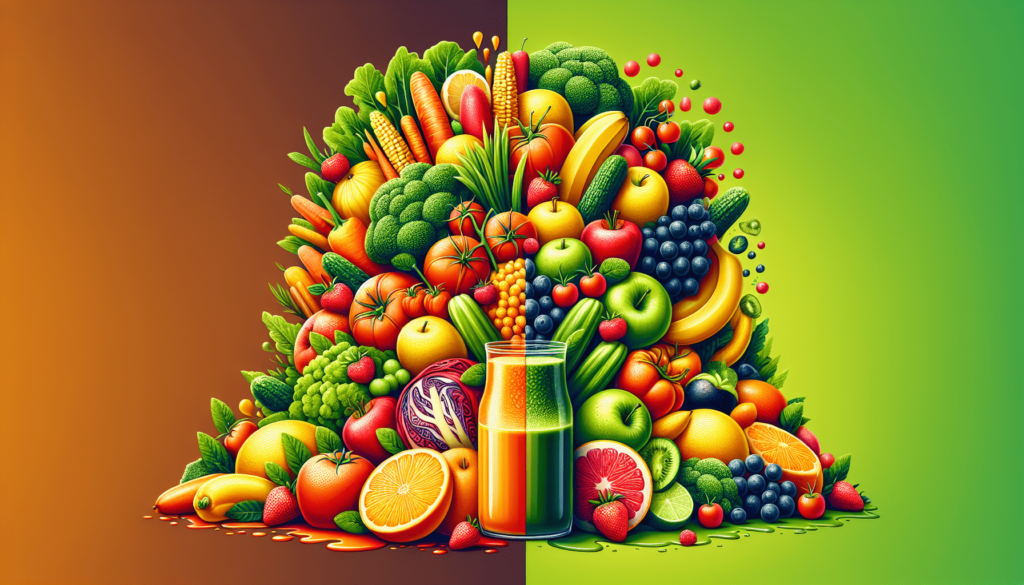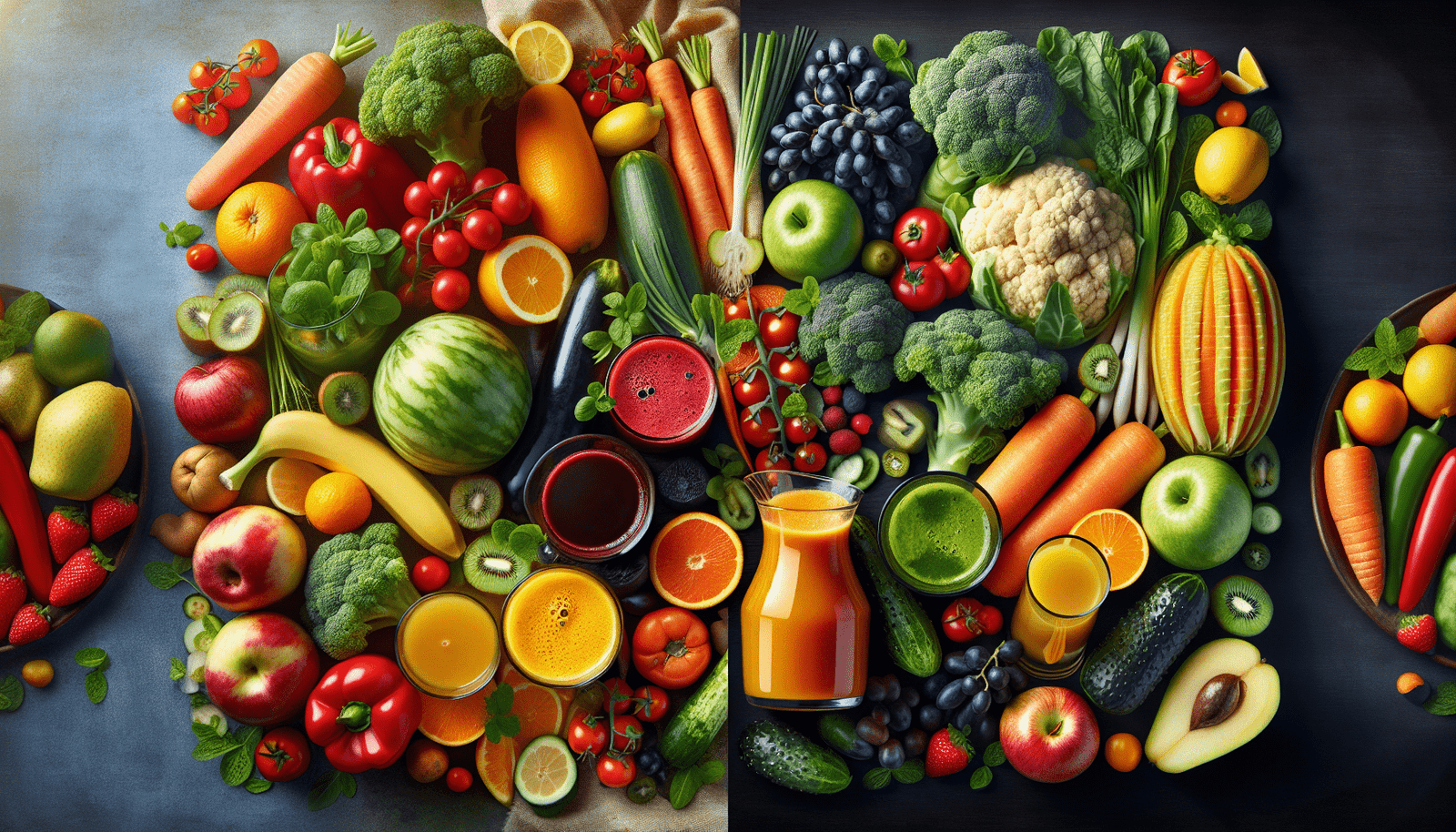Juicing Vs. Whole Foods: The Nutrition Showdown
Have you ever wondered about the differences between juicing and consuming whole foods? In this article, we’ll take a closer look at juicing versus whole foods from a nutritional standpoint. Let’s explore how each option compares in terms of health benefits and overall nutrition.

Juicing: The Pros and Cons
When it comes to juicing, there are both pros and cons to consider. Juicing involves extracting the liquid from fruits and vegetables, leaving behind the fiber. While this can make it easier for your body to absorb the nutrients quickly, it may not provide the same health benefits as consuming whole foods.
Pros of Juicing
Juicing can be a convenient way to increase your intake of fruits and vegetables, especially if you struggle to eat enough of these foods on a daily basis. It allows you to consume a variety of produce in one sitting, making it easier to obtain a range of vitamins and minerals.
Cons of Juicing
One of the main drawbacks of juicing is the removal of fiber during the extraction process. Fiber plays a crucial role in digestive health and can help you feel full and satisfied after a meal. Without fiber, your body may not experience the same satiety levels, potentially leading to overeating.
Whole Foods: The Pros and Cons
On the other hand, consuming whole foods involves eating fruits and vegetables in their natural state, including the fiber-rich skin and pulp. While this may require more time and effort compared to juicing, it offers a wide range of health benefits that juicing may not provide.
Pros of Whole Foods
Whole foods are packed with fiber, vitamins, and minerals that are essential for overall health. The fiber in whole fruits and vegetables can help regulate your digestion and support a healthy gut microbiome. By eating whole foods, you can also enjoy the natural flavors and textures of produce without losing any nutrients during the juicing process.
Cons of Whole Foods
While whole foods offer numerous health benefits, they may not always be as convenient or portable as a bottle of juice. It can take more time to prepare and consume whole fruits and vegetables, especially if you lead a busy lifestyle. However, the nutritional benefits of whole foods often outweigh the drawbacks of convenience.

Nutritional Comparison: Juicing vs. Whole Foods
Let’s break down the nutritional differences between juicing and whole foods to help you make an informed decision about your diet choices.
| Nutrient | Juicing | Whole Foods |
|---|---|---|
| Fiber | Low | High |
| Vitamins and Minerals | Retained | Retained |
| Antioxidants | Retained | Retained |
| Calories | Can be higher due to concentrated juice | Lower due to fiber content |
| Sugar Content | Concentrated from fruits | Natural sugars in fruits |
By comparing the nutritional content of juicing to whole foods, you can see that each option has its own set of advantages and disadvantages. While juicing may offer a concentrated source of vitamins and minerals, it lacks the fiber found in whole fruits and vegetables.
Health Benefits: Juicing vs. Whole Foods
When it comes to health benefits, both juicing and whole foods offer unique advantages. Understanding the differences can help you tailor your diet to meet your nutritional needs and goals.
Health Benefits of Juicing
Juicing can be beneficial for individuals who struggle to eat an adequate amount of fruits and vegetables each day. By juicing a variety of produce, you can easily increase your intake of essential nutrients without feeling overwhelmed by large portions. Juices can also be a convenient way to consume a range of flavors and textures in one sitting.
Health Benefits of Whole Foods
Consuming whole foods provides a wide range of health benefits, including improved digestion, better gut health, and enhanced satiety. The fiber in whole fruits and vegetables helps to regulate blood sugar levels and support a healthy weight. By eating whole foods, you can also reduce your risk of chronic diseases such as heart disease, diabetes, and certain types of cancer.
Weight Management: Juicing vs. Whole Foods
If you’re looking to manage your weight effectively, you may be wondering whether juicing or consuming whole foods is the better option. Let’s explore how these choices can impact your weight management goals.
Weight Management with Juicing
While juicing can be a convenient way to increase your intake of fruits and vegetables, it may not always be the best option for weight management. Juices can be high in calories and sugar, especially if you’re using a lot of fruit in your recipes. Without the fiber found in whole foods, you may not experience the same level of satiety, potentially leading to overeating and weight gain.
Weight Management with Whole Foods
Whole foods, on the other hand, are an excellent choice for weight management due to their high fiber content and low caloric density. The fiber in whole fruits and vegetables can help you feel full and satisfied after a meal, reducing the likelihood of snacking on unhealthy foods. By incorporating whole foods into your diet, you can maintain a healthy weight and support your overall well-being.
Digestive Health: Juicing vs. Whole Foods
The impact of juicing versus whole foods on digestive health is another important factor to consider when choosing between these two options. Let’s explore how each choice can affect your digestion and gut health.
Digestive Health with Juicing
Juicing may not always be the best option for digestive health due to the lack of fiber in extracted juices. Fiber is essential for maintaining regular bowel movements and supporting a healthy gut microbiome. Without an adequate intake of fiber, you may experience digestive issues such as constipation or bloating. It’s important to balance juicing with whole foods to ensure optimal digestive health.
Digestive Health with Whole Foods
Whole foods are a superior choice for digestive health due to their high fiber content and natural nutrients. The fiber in whole fruits and vegetables helps to promote healthy digestion and support a diverse gut microbiome. By consuming whole foods regularly, you can prevent constipation, bloating, and other digestive issues while enjoying a wide range of vitamins and minerals that are essential for overall health.
Cost Comparison: Juicing vs. Whole Foods
When it comes to cost, juicing and consuming whole foods can vary significantly depending on where you live and how you source your produce. Let’s compare the expenses associated with juicing versus whole foods to help you make an informed decision based on your budget.
Cost of Juicing
Juicing can be an expensive option, especially if you’re using a lot of organic produce or specialty ingredients. Juicers can also be a significant upfront investment, depending on the type and quality you choose. Additionally, the cost of juicing may add up over time if you’re regularly purchasing fresh fruits and vegetables to juice.
Cost of Whole Foods
Consuming whole foods can be a cost-effective option, especially if you buy produce in season or in bulk. Whole fruits and vegetables are generally more affordable than pre-packaged juices or smoothies, allowing you to save money while enjoying the nutritional benefits of fresh produce. By shopping smart and planning your meals ahead of time, you can incorporate whole foods into your diet without breaking the bank.
Conclusion: Making Informed Choices
In the debate between juicing and consuming whole foods, both options offer unique advantages and disadvantages that can impact your health and well-being. It’s essential to consider your individual preferences, lifestyle, and nutritional needs when choosing between juicing and whole foods. By understanding the pros and cons of each option, you can make informed choices that support your overall health goals and dietary preferences.
Whether you prefer the convenience of juicing or the nutritional benefits of whole foods, both choices can play a role in a balanced and healthy diet. Experiment with different recipes and meal plans to find what works best for you, and remember to listen to your body’s cues when it comes to hunger and satisfaction. Ultimately, the key to maintaining optimal health is finding a healthy balance that nourishes both your body and mind.

